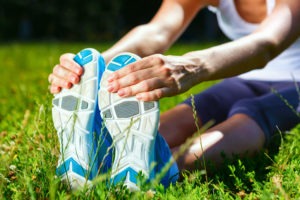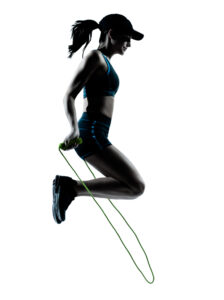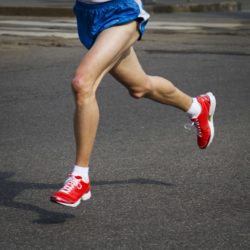How should I adapt my training as I get older?
The good news is that there are areas you can adapt to help you to continue to run well, compete with your previous best times and enjoy your training. The first interesting fact for you, as a runner, is that at least 50% of the age related changes in muscles, bones and joints are caused by disuse. So you are already ahead of the game. This blog was inspired by a Clapham Chaser who asked the very simple question;
“As some of you may have noticed, I\’m not getting any younger. So was wondering if any of our more mature members know of any good articles/books or even tips on how to train effectively as you get older?”
So today we are going to look at the three key factors that can affect your running as you age. The obvious call to all the information below is that the earlier you change your habits / training the better you can control the effects of ageing on your running.

1. Work on your Mobility (Flexibility)
Now this first area affects everyone as we age from youth runners onwards, essentially our lifestyles change and our soft tissues are constantly adapting to these changes. Tightness in your soft tissues, which accelerates as we age, increase resistance for your body to work against which will have the knock on effect of slowing down your speed. One study that followed the effects of VO2 through bed rest and ageing found in a number of athletes that they could restore VO2 to previous levels however speed was still slower on per minute mile pace. At the heart of this issue, it was felt was the lack of tissue mobility.
So what should you do? There are some easy fixes here that can really help improve your mobility. Firstly if you are a runner, and be honest here, what is your warm up like. Really do you spend 15 minutes preparing for your run completing a mix of mobility and activation work? This can include foam rolling, dynamic mobility work and dynamic activation work all focused on improving your running posture, so do not just focus on the legs!
You can use experts too, regular sports massage can be a huge benefit, Pilates and Yoga can both help with your mobility as can using a trainer. Having professional advice can make sure you are completing the right programme for you to obtain the best results for your running.

2. Strength Training for Runners
The effects of sarcopenia, age related muscle loss, begin in your early 30\’s and can progress at about 3-10% per decade depending on the research that you read. Strength training does not just imply heavy weight lifting in the gym, strength training for runners is about tissue tolerance. It is about the strength of your ligaments, your joints, your tendons and your muscle fibres. The best element of this is that with good Progressive Resistance Training you can actually still build muscle strength and develop tissue tolerance. You body will always adapt to the challenges placed in front of it, this is one of the wonderful abilities of the human body. It is task focused and will adapt to succeed.
The research has also noted that the loss is greatest for fast twitch fibres, this is the dynamic muscle that reacts and gets you back off the ground quickly and effectively.
So what should you do? Begin training for your tissue tolerance and muscle strength now. It should be a part of your weekly programme from any age however as you increase in years it becomes more important. Use body weight, bands and TRX to get you loading the tissues. Again it is important to remember your body will have different stresses placed on it through your life, as such being assessed by an expert can help you achieve the best results. The key is getting your training in effectively around your running plans and events, one good session a week with 3 key exercises for your body post each run could be perfect to help you cope with the effects of ageing.
Please remember to keep some of your training dynamic, work those fast twitch fibres and build good loading for the tendons. Time on the ground will be reduced and you will feel lighter and faster as a result.

3. Your Training Week
In this part we look at both your training week and recovery. The two are so inter-linked there is no way to separate them. The obvious first area of concern will be changes in your VO2, most runners will be aware of this issue, and it is accepted that the rate is about 5% of capacity each decade. What is happening though is a combination of slowing of your heart rate, related primarily to the rate your heart can actually relax. This is unfortunately more out of your control as a factor you can change, however research continues to understand these changes more effectively.
The same study on the effects of bed rest also showed that VO2 was effected more by 3 weeks of bed rest than by just 3 decades. Interestingly the stoke volume, amount of blood pumped per heart beat, had increased with age. Primarily related to the heart enlarging as it has to work against stiffer arteries. As it turns out this is enough to counter the effects of the reduced heart rate.
Recovery is a huge part of your training week because as we get older our muscles and tendons require more time to recover. This should not affect your race speed if you plan your training week and race preparation wisely. Most will look at lowering their weekly volume, which is wise however probably not necessary until you are in your mid 40\’s, and even then it will vary from individual to individual, the previous two factors can be major players in your recovery time required.
So what should you do? Firstly do not panic and make dramatic changes to your current training programme. Sit down and work out your goals for the year ahead, including key races, then work backwards form there building a good tamper if you are completing distance running and work your programme out accordingly. The good news is your base levels will be good and should be easy to maintain, so it is about getting the correct recovery and speed work into your running plan.
Again the advice and input from a running coach can help you plan for your individual requirements. They will also put together a better plan for your body considering the effects of previous injuries, related restrictions and build n your strength training wisely around your weekly programme.
So Build A Better More Durable Runner.
Happy Running